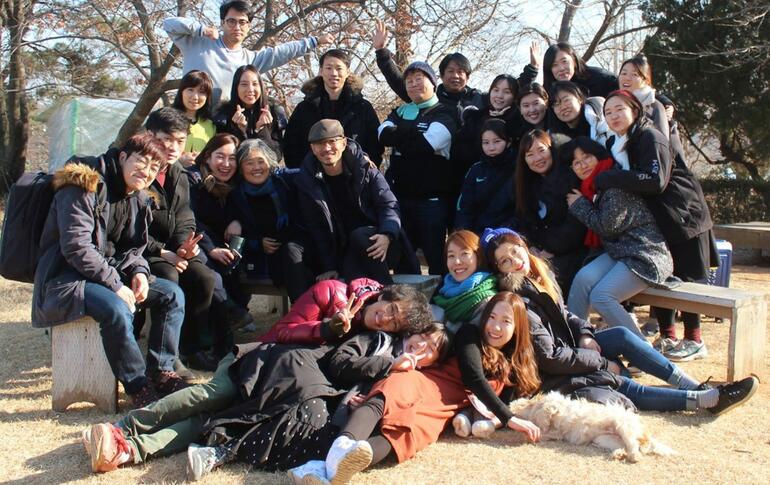About Jayuskole
Jayuskole’s motto is a safe laboratory for rest and transition. Our mission is to help people to find and walk towards their own reasons for living. (Reason for being / Raison d'être).
Our first principle is dialogue with living words. No matter what space we use, we create a common room in order to foster an environment where people can talk comfortably with one another.
Our second principle is horizontal relationships. People who run Jayusokle are called facilitators, not such titles like instructors or teachers. No matter what field of expertise we may have, we are committed to remember that we are here to support others’ growth.
Our third principle is community. We also sing together in the morning, ask each other how we are, and take care of ourselves to build community.
Lastly, we did not forget to include hygge throughout the program.
There are three chairs in Jayuskole.
1. The solitary chair : For self-questioning, self-awareness
2. The facing chair : For living dialog and relationships
3. The round table : For respect for difference, the power of transformation, and diversity.
Interview with Ejang
Asoke: What is the name of your Folk High School? Why such name was adopted and what are the socio-economic reasons?
Ejang: Our Folk High School name is Jayuskole. Jayu(자유) is short for self-reason(자기이유), and it means freedom.I think it's better to call it liberty. Our motto is a safe laboratory for rest and transition. And our mission is to help people to find and walk towards their own reasons for living. (Reason for being / Raison d'être). Korea has a strong collectivist culture that emphasizes ‘we/us’ too much. We all know that we need a 'rest' in our lives. However, we are just forgetting the importance of 'rest' in a social culture that recommends running only looking ahead.Jayuskole aims to become a safe living space for those who seek "transition" in their lives by "resting". We believe that with the support and support of those who are with you, you will have the strength to take full care of yourself and plan for the next one.
Asoke: When was it established and why?
Ejang: Started our program for the first time in the winter of 2017. Jayuskole is run by a group of people with different gender and age and professional backgrounds. We agreed to implement in Korea what we experienced from Denmark, and we were able to start with people who supported us. People who have experienced folk high school say. “Through the experience of folk high school, I have a deep and new understanding of myself as well as of others."
Asoke: What role was it supposed to play in the context of the culture of South Korea?
Ejang: Korea has the longest working hours, and everything is fast and efficiency is important. Jayuskole wants to become a community of friendship and trust that communicates with each other, understands each other, and respects each other. Hope someone’s time at Jayuskole will be an important turning point in their life.
Asoke: What are the present activities of the FHS and what are the future plans?
Ejang: We are preparing for our sixth program for a week in December, and we are thinking of networking with Japan in March next year, and we are planning to recruit participants in spring and fall a year and go to Danish folk school for a month and experience it ourself.
Asoke: How are the activities of the FHS impacting on South Korean society and which section particularly?
Ejang: Although there is no direct impact, interest in what we do is increasing as social and cultural changes occur, and more and more programs are making similar efforts. In one case, one of the mayors of a city asked us to run a program for the happiness of citizens. There seems to be a lot of interest in the public sectors for citizens and education sectors.
Asoke: How are you developing the global network? Please give details.
Ejang: Although we are focusing on our activities in Korea first, we are recruiting participants twice a year in the spring and fall semesters and conducting a month-long program in Denmark. When Danish students came to Korea, we invited them to a local city in Korea to share about folk high school. A few years ago, when there was political tension between Korea and Japan, people interested in folk high school from both countries gathered in Korea and held a short program. Next year, we will visit one of the folk high schools in Japan to share our experiences and talk about what we can do together in the future.
